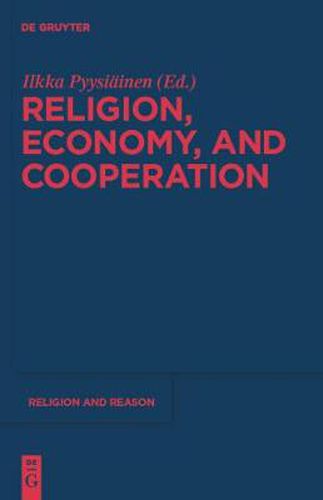Readings Newsletter
Become a Readings Member to make your shopping experience even easier.
Sign in or sign up for free!
You’re not far away from qualifying for FREE standard shipping within Australia
You’ve qualified for FREE standard shipping within Australia
The cart is loading…






This title is printed to order. This book may have been self-published. If so, we cannot guarantee the quality of the content. In the main most books will have gone through the editing process however some may not. We therefore suggest that you be aware of this before ordering this book. If in doubt check either the author or publisher’s details as we are unable to accept any returns unless they are faulty. Please contact us if you have any questions.
Why give money to beggars? Why make sacrifices to help others? The current volume targets such questions with the tools of neoclassical and behavioural economics, philosophy, and sociology of religion. Both religion and economics are analyzed as social institutions that support human intra-group cooperation. Even if individuals are rational maximizers of personal utility, they yet must take into account the reciprocal nature of human relationships. It is better to be part of a cooperative group and make some personal sacrifices because, in the end, everybody benefits from this. Sometimes the metaphor of an invisible hand is used to describe the fact that economic exchange seems to follow some rules that guarantee the best possible result for everyone. In religion, it is of course the hand of God that guides the world. In both cases, individuals are in a way playing against a superior being that always seems to win. In this volume, some of the cognitive mechanisms and cultural selective forces behind this are examined by specialists in different fields of science. The first contributions analyze theoretical and methodological issues; in later chapters, developments in the European history are explored from the perspectives of sociology and economic theory.
$9.00 standard shipping within Australia
FREE standard shipping within Australia for orders over $100.00
Express & International shipping calculated at checkout
This title is printed to order. This book may have been self-published. If so, we cannot guarantee the quality of the content. In the main most books will have gone through the editing process however some may not. We therefore suggest that you be aware of this before ordering this book. If in doubt check either the author or publisher’s details as we are unable to accept any returns unless they are faulty. Please contact us if you have any questions.
Why give money to beggars? Why make sacrifices to help others? The current volume targets such questions with the tools of neoclassical and behavioural economics, philosophy, and sociology of religion. Both religion and economics are analyzed as social institutions that support human intra-group cooperation. Even if individuals are rational maximizers of personal utility, they yet must take into account the reciprocal nature of human relationships. It is better to be part of a cooperative group and make some personal sacrifices because, in the end, everybody benefits from this. Sometimes the metaphor of an invisible hand is used to describe the fact that economic exchange seems to follow some rules that guarantee the best possible result for everyone. In religion, it is of course the hand of God that guides the world. In both cases, individuals are in a way playing against a superior being that always seems to win. In this volume, some of the cognitive mechanisms and cultural selective forces behind this are examined by specialists in different fields of science. The first contributions analyze theoretical and methodological issues; in later chapters, developments in the European history are explored from the perspectives of sociology and economic theory.